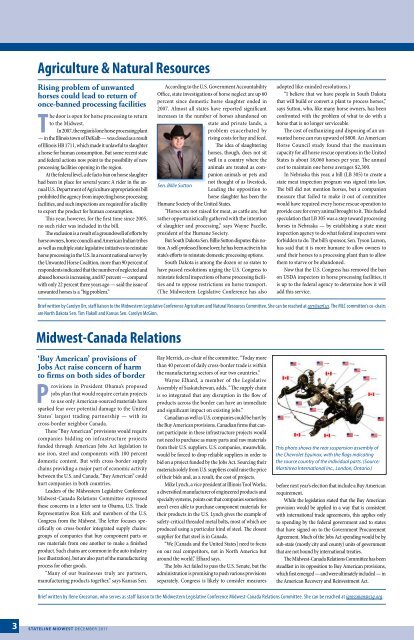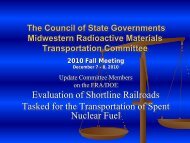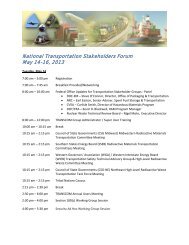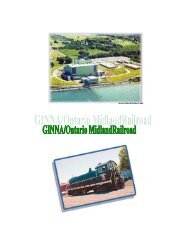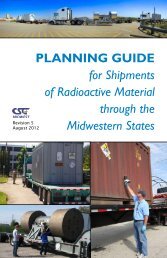Stateline Midwest - CSG Midwest
Stateline Midwest - CSG Midwest
Stateline Midwest - CSG Midwest
You also want an ePaper? Increase the reach of your titles
YUMPU automatically turns print PDFs into web optimized ePapers that Google loves.
Agriculture & Natural Resources<br />
Rising problem of unwanted<br />
horses could lead to return of<br />
once-banned processing facilities<br />
The door is open for horse processing to return<br />
to the <strong>Midwest</strong>.<br />
In 2007, the region’s lone horse processing plant<br />
— in the Illinois town of DeKalb — was closed as a result<br />
of Illinois HB 1711, which made it unlawful to slaughter<br />
a horse for human consumption. But some recent state<br />
and federal actions now point to the possibility of new<br />
processing facilities opening in the region.<br />
At the federal level, a de facto ban on horse slaughter<br />
had been in place for several years: A rider in the annual<br />
U.S. Department of Agriculture appropriations bill<br />
prohibited the agency from inspecting horse processing<br />
facilities, and such inspections are required for a facility<br />
to export the product for human consumption.<br />
This year, however, for the first time since 2005,<br />
no such rider was included in the bill.<br />
The exclusion is a result of a groundswell of efforts by<br />
horse owners, horse councils and American Indian tribes<br />
as well as multiple state legislative initiatives to reinstate<br />
horse processing in the U.S. In a recent national survey by<br />
the Unwanted Horse Coalition, more than 90 percent of<br />
respondents indicated that the number of neglected and<br />
abused horses is increasing, and 87 percent — compared<br />
with only 22 percent three years ago — said the issue of<br />
unwanted horses is a “big problem.”<br />
According to the U.S. Government Accountability<br />
Office, state investigations of horse neglect are up 60<br />
percent since domestic horse slaughter ended in<br />
2007. Almost all states have reported significant<br />
increases in the number of horses abandoned on<br />
state and private lands, a<br />
problem exacerbated by<br />
rising costs for hay and feed.<br />
The idea of slaughtering<br />
horses, though, does not sit<br />
well in a country where the<br />
animals are treated as companion<br />
animals or pets and<br />
not thought of as livestock.<br />
Sen. Billie Sutton<br />
Leading the opposition to<br />
horse slaughter has been the<br />
Humane Society of the United States.<br />
“Horses are not raised for meat, as cattle are, but<br />
rather opportunistically gathered with the intention<br />
of slaughter and processing,” says Wayne Pacelle,<br />
president of the Humane Society.<br />
But South Dakota Sen. Billie Sutton disputes this notion.<br />
A self-professed horse lover, he has been active in his<br />
state’s efforts to reinstate domestic processing options.<br />
South Dakota is among the dozen or so states to<br />
have passed resolutions urging the U.S. Congress to<br />
reinstate federal inspections of horse processing facilities<br />
and to oppose restrictions on horse transport.<br />
(The <strong>Midwest</strong>ern Legislative Conference has also<br />
adopted like-minded resolutions.)<br />
“I believe that we have people in South Dakota<br />
that will build or convert a plant to process horses,”<br />
says Sutton, who, like many horse owners, has been<br />
confronted with the problem of what to do with a<br />
horse that is no longer serviceable.<br />
The cost of euthanizing and disposing of an unwanted<br />
horse can run upward of $800. An American<br />
Horse Council study found that the maximum<br />
capacity for all horse rescue operations in the United<br />
States is about 18,060 horses per year. The annual<br />
cost to maintain one horse averages $2,300.<br />
In Nebraska this year, a bill (LB 305) to create a<br />
state meat inspection program was signed into law.<br />
The bill did not mention horses, but a companion<br />
measure that failed to make it out of committee<br />
would have required every horse rescue operation to<br />
provide care for every animal brought to it. This fueled<br />
speculation that LB 305 was a step toward processing<br />
horses in Nebraska — by establishing a state meat<br />
inspection agency to do what federal inspectors were<br />
forbidden to do. The bill’s sponsor, Sen. Tyson Larson,<br />
has said that it is more humane to allow owners to<br />
send their horses to a processing plant than to allow<br />
them to starve or be abandoned.<br />
Now that the U.S. Congress has removed the ban<br />
on USDA inspectors in horse processing facilities, it<br />
is up to the federal agency to determine how it will<br />
add this service.<br />
Brief written by Carolyn Orr, staff liaison to the <strong>Midwest</strong>ern Legislative Conference Agriculture and Natural Resources Committee. She can be reached at corr@sarl.us. The MLC committee’s co-chairs<br />
are North Dakota Sen. Tim Flakoll and Kansas Sen. Carolyn McGinn.<br />
<strong>Midwest</strong>-Canada Relations<br />
‘Buy American’ provisions of<br />
Jobs Act raise concern of harm<br />
to firms on both sides of border<br />
P<br />
rovisions in President Obama’s proposed<br />
jobs plan that would require certain projects<br />
to use only American-sourced materials have<br />
sparked fear over potential damage to the United<br />
States’ largest trading partnership — with its<br />
cross-border neighbor Canada.<br />
These “Buy American” provisions would require<br />
companies bidding on infrastructure projects<br />
funded through American Jobs Act legislation to<br />
use iron, steel and components with 100 percent<br />
domestic content. But with cross-border supply<br />
chains providing a major part of economic activity<br />
between the U.S. and Canada, “Buy American” could<br />
hurt companies in both countries.<br />
Leaders of the <strong>Midwest</strong>ern Legislative Conference<br />
<strong>Midwest</strong>-Canada Relations Committee expressed<br />
these concerns in a letter sent to Obama, U.S. Trade<br />
Representative Ron Kirk and members of the U.S.<br />
Congress from the <strong>Midwest</strong>. The letter focuses specifically<br />
on cross-border integrated supply chains:<br />
groups of companies that buy component parts or<br />
raw materials from one another to make a finished<br />
product. Such chains are common in the auto industry<br />
(see illustration), but are also part of the manufacturing<br />
process for other goods.<br />
“Many of our businesses truly are partners,<br />
manufacturing products together,” says Kansas Sen.<br />
Ray Merrick, co-chair of the committee. “Today more<br />
than 40 percent of daily cross-border trade is within<br />
the manufacturing sectors of our two countries.”<br />
Wayne Elhard, a member of the Legislative<br />
Assembly of Saskatchewan, adds, “The supply chain<br />
is so integrated that any disruption in the flow of<br />
products across the border can have an immediate<br />
and significant impact on existing jobs.”<br />
Canadian as well as U.S. companies could be hurt by<br />
the Buy American provisions. Canadian firms that cannot<br />
participate in these infrastructure projects would<br />
not need to purchase as many parts and raw materials<br />
from their U.S. suppliers. U.S. companies, meanwhile,<br />
would be forced to drop reliable suppliers in order to<br />
bid on a project funded by the Jobs Act. Sourcing their<br />
materials solely from U.S. suppliers could raise the price<br />
of their bids and, as a result, the cost of projects.<br />
Mike Lynch, a vice president at Illinois Tool Works,<br />
a diversified manufacturer of engineered products and<br />
specialty systems, points out that companies sometimes<br />
aren’t even able to purchase component materials for<br />
their products in the U.S. Lynch gives the example of<br />
safety-critical threaded metal bolts, most of which are<br />
produced using a particular kind of steel. The closest<br />
supplier for that steel is in Canada.<br />
“We [Canada and the United States] need to focus<br />
on our real competitors, not in North America but<br />
around the world,” Elhard says.<br />
The Jobs Act failed to pass the U.S. Senate, but the<br />
administration is promising to push various provisions<br />
separately. Congress is likely to consider measures<br />
This photo shows the rear suspension assembly of<br />
the Chevrolet Equinox, with the flags indicating<br />
the source country of the individual parts. (Source:<br />
Martinrea International Inc., London, Ontario.)<br />
before next year’s election that include a Buy American<br />
requirement.<br />
While the legislation stated that the Buy American<br />
provision would be applied in a way that is consistent<br />
with international trade agreements, this applies only<br />
to spending by the federal government and to states<br />
that have signed on to the Government Procurement<br />
Agreement. Much of the Jobs Act spending would be by<br />
sub-state (mostly city and county) units of government<br />
that are not bound by international treaties.<br />
The <strong>Midwest</strong>-Canada Relations Committee has been<br />
steadfast in its opposition to Buy American provisions,<br />
which first emerged — and were ultimately included — in<br />
the American Recovery and Reinvestment Act.<br />
Brief written by Ilene Grossman, who serves as staff liaison to the <strong>Midwest</strong>ern Legislative Conference <strong>Midwest</strong>-Canada Relations Committee. She can be reached at igrossman@csg.org.<br />
3 STATELINE MIDWEST December 2011


